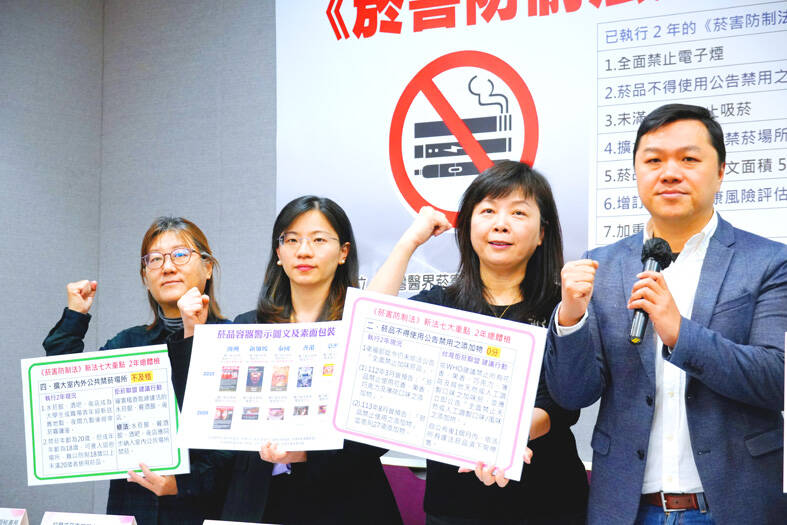Taiwan is soon to issue its first decision on whether to approve the sale of a heated tobacco product, two years after amendments to the Tobacco Hazards Prevention Act (菸害防制法) were promulgated in March 2023.
The amended tobacco act allows a path to legalization for heated tobacco products on a case-by-case basis, Health Promotion Agency (HPA) Director-General Wu Chao-chun (吳昭軍) said yesterday.
Eleven tobacco manufacturers have submitted claims to the HPA, six of which have completed the documentation assessment phase of the approval evaluation process, Wu told a news conference.

Photo: CNA
Product testing, which composes the second phase of the evaluation, takes six months and the result of one manufacturer’s application is expected to be announced as soon as next month, he said.
The manufacturer would be authorized to commercialize their product with the appropriate labeling and health warning should it pass the assessment, he added.
If not, the manufacturer can submit product documentation again to restart the process or litigate the outcome by seeking an administrative remedy, Wu said.
Announcements of the application results would be staggered, as they did not complete the documentation phase at the same pace, he said, adding that missing or unsatisfactory documents must be rectified for the process to continue.
Separately, the Alliance of Banning Cigarettes Taiwan, a coalition of advocacy and medical groups against tobacco use, held a news conference yesterday denouncing the amended act.
Lin Ching-li (林清麗), an official at the John Tung Foundation, said the approach of banning flavored cigarettes by listing specifically prohibited additives is flawed.
Tobacco companies easily skirt the regulations by creating new substances to stay ahead of regulators, she said, adding that 90 percent of first-time smokers use a flavored product.
The WHO recommendation is to prohibit all artificial or natural flavoring agents, she said.
Bars continue to allow patrons to smoke indoors without establishing a separate smoking area as the law requires, Mother’s Shield Alliance secretary-general Tang Hsien-mei (唐仙美) said.
Members of the coalition also said that the “health risk assessment,” the HPA’s misguided name of the approval process, enables manufacturers to untruthfully advertise heated products as a less harmful alternative to cigarettes.
Tobacco product sales approval evaluation or assessment should be the correct terminology for the testing protocol, they said.
HPA Tobacco Control Division head Lo Su-ying (羅素英) said the government had comprehensively gathered the opinions of experts and medical professionals when drawing up the act.
The agency’s name for the process reflects its intended purpose of scientifically gauging a product’s public health impact, she said.

Taiwan has received more than US$70 million in royalties as of the end of last year from developing the F-16V jet as countries worldwide purchase or upgrade to this popular model, government and military officials said on Saturday. Taiwan funded the development of the F-16V jet and ended up the sole investor as other countries withdrew from the program. Now the F-16V is increasingly popular and countries must pay Taiwan a percentage in royalties when they purchase new F-16V aircraft or upgrade older F-16 models. The next five years are expected to be the peak for these royalties, with Taiwan potentially earning

STAY IN YOUR LANE: As the US and Israel attack Iran, the ministry has warned China not to overstep by including Taiwanese citizens in its evacuation orders The Ministry of Foreign Affairs (MOFA) yesterday rebuked a statement by China’s embassy in Israel that it would evacuate Taiwanese holders of Chinese travel documents from Israel amid the latter’s escalating conflict with Iran. Tensions have risen across the Middle East in the wake of US and Israeli airstrikes on Iran beginning Saturday. China subsequently issued an evacuation notice for its citizens. In a news release, the Chinese embassy in Israel said holders of “Taiwan compatriot permits (台胞證)” issued to Taiwanese nationals by Chinese authorities for travel to China — could register for evacuation to Egypt. In Taipei, the ministry yesterday said Taiwan

‘LIKE-MINDED PARTNER’: Tako van Popta said it would be inappropriate to delay signing the deal with Taiwan because of China, adding he would promote the issue Canadian senators have stressed Taiwan’s importance for international trade and expressed enthusiasm for ensuring the Taiwan-Canada trade cooperation framework agreement is implemented this year. Representative to Canada Harry Tseng (曾厚仁) in an interview with the Central News Agency (CNA) said he was increasingly uneasy about Ottawa’s delays in signing the agreement, especially as Ottawa has warmed toward Beijing. There are “no negotiations left. Not only [is it] initialed, we have three versions of the text ready: English, French and Mandarin,” Tseng said. “That tells you how close we are to the final signature.” Tseng said that he hoped Canadian Prime Minister Mark Carney

POSITIVE DEVELOPMENT: Japan and the US are expected to hold in-depth discussions on Taiwan-related issues during the meeting next month, Japanese sources said The holding of a Japan-US leaders’ meeting ahead of US President Donald Trump’s visit to China is positive news for Taiwan, former Japan-Taiwan Exchange Association representative Hiroyasu Izumi said yesterday. After the Liberal Democratic Party’s landslide victory in Japan’s House of Representatives election, Japanese Prime Minister Sanae Takaichi is scheduled to visit the US next month, where she is to meet with Trump ahead of the US president’s planned visit to China from March 31 to April 2 for a meeting with Chinese President Xi Jinping (習近平). Japan and the US are expected to hold in-depth discussions on Taiwan-related issues during the